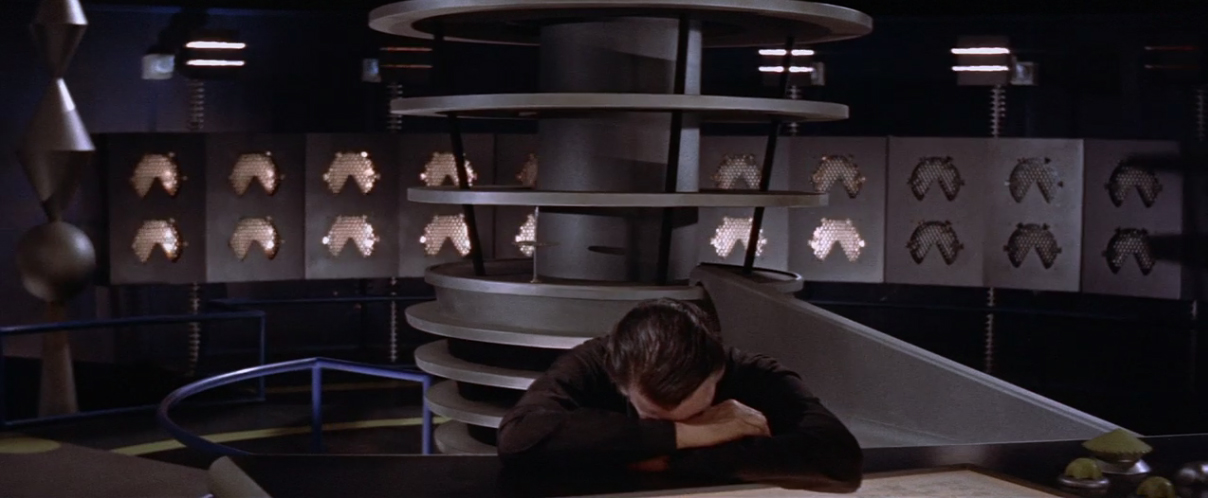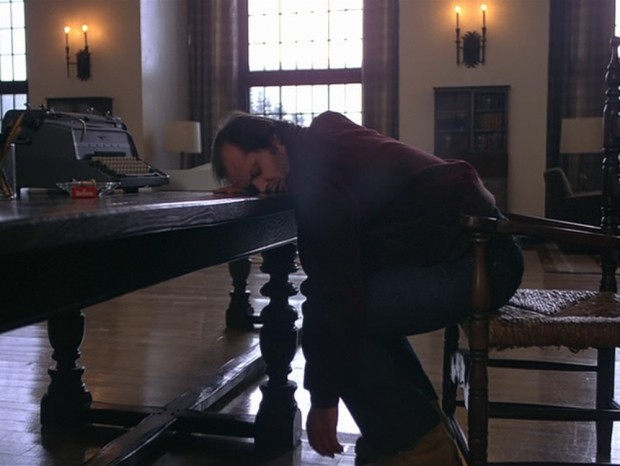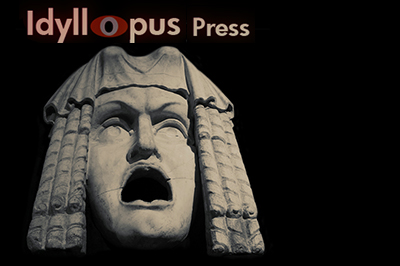Comparing Jack's Nightmare in The Shining

Go to Table of Contents of the analysis (which has also a statement on purpose and manner of analysis and a disclaimer as to caveat emptor and my knowing anything authoritatively, which I do not, but I do try to not know earnestly, with some discretion, and considerable thought).
The story of Shakespeare's The Tempest, a play directly referenced in Kubrick's Fear and Desire, concerns a magician, Prospero, who becomes marooned on an island with his young daughter, Miranda. Sent, for all intents and purposes, to their deaths, it is Prospero's own brother, Antonio, who has deposed him for the purpose of taking his place as the Duke of Milan, Antonio having swayed the opinion of the King of Naples to his side as well. On the island, Prospero magically binds to his will a spirit, Ariel, who must do all Prospero asks of him, and enslaves as well the only resident of the island, Caliban, to perform physical tasks. Miranda having attained puberty, when Prospero learns that a ship carrying, among others, his brother, and Alonso, will be passing nearby, he has Ariel cause the appearance of a terrible storm that appears to wreck the boat and forces Alonso and the others onto the island. Prospero's purpose is to take revenge, causing those who had wronged him to go nearly mad from various psychic horrors, the king grief-stricken with the belief that his son, Ferdinand, was killed during the storm. Ariel is dismayed enough by the all-encompassing madness, that he begs Prospero to have pity. So Prospero releases them, shows himself and offers forgiveness, but he does so only after the king's son, also shipwrecked, has become engaged to Miranda, which secures a positive outcome for the future of Prospero and Miranda. Prospero's dukedom is restored. Preparing to leave the island, he announces that he will practice no more magic.
Prospero, as a magician, was a Renaissance alchemist, a scientist and philosopher, and as an alchemist would be qualified as a good guy, as opposed to, say, Caliban's mother (deceased before Prospero and Miranda land on the island), a sorceress, a practitioner of the dark arts and therefore bad. But one of the subjects of the play is just how "good" this good Prospero is. He has, after all, enslaved Ariel and Caliban. When given the opportunity, the level of cruelty to which he sinks is such that his daughter must continually reassure the prince that her father does not act like himself. And, as noted already, Ariel pleads with Prospero for those he has, by illusion, shipwrecked on the island, he finding Prospero's magic exceedingly harsh.
Forbidden Planet is a 1956 science fiction film, directed by Fred M. Wilcox, that has a loose relationship to The Tempest. A starship, C-57D, arrives at a planet, Altair IV, to determine what had happened to an expedition sent there two decades prior. Morbius, a surviving scientist on the planet, tries to warn the starship away, telling them if they land he will be unable to guarantee their safety. They land anyway and we learn that, with the exception of Morbius, and his daughter, Alta, an unknown force had destroyed the rest of the expedition person by person and then en masse when they attempted to leave the planet, their ship, the Bellerophon being vaporized. We learn also there had been previously on the planet a highly advanced civilization, the Krell, who had also mysteriously perished despite their vast and superior knowledge.
Alta, Morbius' daughter, falls in love with Adams, the commander of the visiting ship, who insists that Morbius and his daughter must return to earth, whereas Morbius demands to remain on the planet and continue his research. The same unknown, planetary force, that had destroyed the members of the expedition, murderously manifests again. Attacking the ship and killing several members of the crew, when the entity comes into contact with a protective force field around the ship, we briefly see a red, raging monster. While the attack is occurring, Morbius is shown asleep at his desk. When he wakes, the monster disappears.
Robby the Robot, built by Morbius through knowledge attained from the Krell, had taken care of the material needs of Morbius and his daughter. We also learn that a machine had been built by the Krell that would materialize all they desired by their simply wishing it, and this is what destroyed them, for they didn't know the secrets of their subconscious, their "monster ID". Morbius, whose intellect had been enhanced by a machine of the Krell's, was endowed with the same power. It was his subconscious that had murdered the members of the expedition, and his subconscious that was assailing the reconnaissance ship and its crew. His subconscious, his ID, is the monster.
Twenty years ago, when your comrades voted to return to Earth, you sent your secret Id out to murder them, not quite realizing it, of course, except maybe in your dreams.
Morbius is warned he will now even unwillingly endanger his own daughter as she is defying him and, his "egomaniac empire" threatened, in frustration his enraged subconscious will continue to strike out uncontrollably. Ultimately, he accepts that he is responsible, battles the monster created by his subconscious and is killed by it. The rest escape. The planet is destroyed so that no others may gain access to such power. Morbius will be remembered by the generations for his hubris.


Robby the Robot, and the Krell's machine that granted all desires, can be found in Ariel and Caliban who carry out Prospero's wishes. Ariel hasn't the independence to do anything but what Prospero commands him to do, partly because Prospero's powers are such that he holds over his head the threat that he could imprison him in a tree, as Caliban's mother had done. Caliban, the original denizen of the island who has been abused by Prospero, and wishes him dead, is also a slave of Prospero but is able to actively pursue vengeance and freedom from Prospero in a manner that it seems Ariel can't. He even offers his knowledge and aid to two individuals who he hopes will kill Prospero.
One can see in Forbidden Planet elements of an Eden myth. In their garden, there is everything present for Morbius and Alta to be happy, but then Adams arrives and Alta falls in love with him. With his acquisition of power and knowledge, Morbius had become a god-man, and it is this power that makes Eden untenable due the malignancy of Morbius' subconscious desires. The moral given is that Morbius is not god. Humans are not god. They are unable to completely know themselves and their own evil opposes them.
The theme of the unknown desires of the subconscious, and the anxiety of being confronted with them via an intelligence that is able to make manifest one's desires or random thoughts, is found in Tarkovsky's Solaris, and in Tarkovsky's Stalker as well by virtue of an artifact left behind on Earth by an advanced intelligence. With Solaris, Tarkovsky formed a dialogue with Kubrick's 2001, to which I think Kubrick responds in The Shining, which I've written about here. Certainly we see in The Shining, as in Stalker, and Solaris, the idea of one's subconscious being exploited, manipulated, and magnified by an "other". King's book largely shifts blame for Jack's heinous behavior over to an evil paranormal energy united with the Overlook, though the boiler at the hotel is certainly a metaphor for Jack's bottled-up rage. Kubrick preserves the paranormal aspect as a possible, an evil apart from self, but he also presents the audience with Jack's malevolence as springing from within him in a situation similar to Morbius' plight in Forbidden Planet. This also echoes Solaris with the subconscious being the resource for distressing apparitions that become, for all intents and purposes, real, are experienced by others, and can haunt a person to death.
In The Shining, we have a scene in which Jack has a nightmare coincident with Danny being mysteriously and seriously injured. Wendy is in the basement tending the boiler when she hears Jack cry out. She rushes to his aid, waking him up, and Jack confesses to Wendy that he had dreamed he murdered her and Danny. When the injured, traumatized Danny enters, she believes Jack has brutalized him. Wendy has reason to jump to this conclusion as we know that Jack had once injured Danny's arm, and though she had thought Jack was doing all right, not drinking, we've already seen how he has begun to inflict his rage on her at the hotel.
Stephen King's book doesn't have in it a scene in which Jack has a nightmare while Danny is attacked in room 237. As I watched Forbidden Planet, knowing that Kubrick employs themes from The Tempest in his work, it struck me that Jack's nightmare scene may be referring to Morbius, who is blind to how his subconscious has manifested as a destructive monster that has wrecked havoc while he slept. Kubrick, too, offers the audience the option of believing that Jack is somehow responsible for what happened to Danny, but he also keeps the audience in a state of suspence, uncertain, unable to make a judgment, to reach any firm conclusion.
Morbius is asked at one point if, after the members of the expedition were killed, he was ever bothered by the planetary force that had murdered them.
Only in nightmares of those times. And yet, always in my mind...I seem to feel the creature is lurking somewhere close at hand, sly and irresistible, and only waiting to be re-invoked for murder.
Forbidden Planet seems to have purposefully complicated Morbius' daughter by raising the question as to why Morbius' marriage is not on record. In response, Morbius states the marriage took place on ship and that he has the marriage certificate. His wife died "of natural causes" six months after their landing on the planet, several months after the deaths of the others. We know it takes about a year to travel from Earth to Altair, so Morbius' daughter could have been born on ship or on Altair, we don't know which is the case. Still, for some reason, the question has been raised as to the reality of the marriage and thus, consequently, Alta's reality.
At the film's beginning, Morbius calls his daughter Alta, and seems to have planned to keep her hidden from the reconnaissance mission, at least for a time, as he mildly scolds her when she makes an appearance, reminding her he had told her not to join them for lunch. He didn't mention her to the visitors, giving the impression he was the only person left alive, so did he intend to keep her hidden for only a time or absolutely? We are well into the movie before we learn that Alta's full name is Altaira, this knowledge availed when Morbius demonstrates the Krell's "plastic educator" by which he has been trained to make his thoughts perceivable. When he demonstrates the educator, the image that appears, and which astonishes the visitors, Morbius describes as a living "statue" of "Altaira", only now calling her by her full name rather than her nickname. If we hadn't made the connection between "Alta" and "Altair" beforehand, we now realize she was named for the planet that is Morbius' domain, and it's interesting that he manifests her, as her 3d representation is described as "being alive", to which Morbius responds that she is alive in his brain from microsecond to microsecond.
It would seem the film is giving us the opportunity to question the reality of the existence of Alta. Is she a thought form? If this "statue" of Altaira is alive, because she lives in his thoughts, then what of the woman who has been presented as his daughter?
When Morbius has his nightmare while the men are being attacked by the "monster", he wakes to hear his daughter calling out for him. We never hear what Morbius might have dreamt, instead the connection to the monster's attack is made through Altaira. She describes a dream that she'd just had.
Altaira: I just had a terrible dream. There was blood and fire and thunder and something awful was moving in the middle of it. I could hear the roar and bellow.
Morbius: Now, now, now, you know a dream can't hurt you.
Altaira: Not me. Not us. The thing I saw was trying to break into camp. It was gonna kill...
We can explain the dream away as Alta being simply highly intuitive, connected psychically to her father. But, again, with her being tuned into her father unconsciously manufacturing the "monster", we are returned to Morbius having earlier manifested the "living" 3d Altaira from his thoughts, the question raised as to whether a marriage had actually taken place, and we wonder about this daughter's true nature. Had Alta only been a thought form, she perhaps would have blinked out when Morbius dies. She doesn't. We can choose to take Morbius at his word, that he was married and Alta is a child of that marriage. But the script opens up a door also for us to question if Alta has been thought-manufactured with such success that she is human, and in this sense she is still Morbius' daughter, an Athena born from Zeus' head.
I suppose one could even raise the question as to if Alta is the one whose dreams forged the monster--and though I'm going to go ahead and assume that's not the case, again, we have some ambiguity, and that ambiguity resonates well with Kubrick's making The Shining as ambiguous as it is so that people have discussed for decades what is the reality of the Overlook.
Many works are informed by The Tempest, or present similar themes, so why choose to reference Forbidden Planet, if, indeed, Kubrick does so? Because it concerns space travel and by this we could turn our thoughts back to 2001?
Here, I have concentrated on Jack's nightmare and seeming paranormal occurrences at the Overlook and the parallel with Morbius' subconscious escaping his control while he sleeps and manifesting physically. Sleep plays an important part in a few of Kubrick's films. In 2001 we have views of Heywood Floyd sleeping, and two views of Bowman sleeping while Poole is listening to a birthday message from his parents. Many in the audience may assume these views of Bowman sleeping are simultaneous with Poole listening to his parents, but they aren't. When we see Bowman sleeping, Poole is not on the tanning bed next to Bowman's sleep pod. That scene is followed by Poole sleeping and Bowman showing HAL his sketches of the hibernators, which is when HAL makes his false prognosis that will ultimately lead to the deaths of all on the ship but Bowman. If we consider sleep and The Shining, it's when Wendy is asleep that Danny writes REDRUM on the door, during which time Jack has escaped the locker, he waking from a nap just before Grady speaks with him through the storage room door. Danny is never observed sleeping, instead he is in trance states in which Tony takes over, which Danny has described as being like sleep, and during which he becomes absent. While in his trance state, Danny had seen the two girls, he had seen himself screaming in response to Dick's murder, he had seen the bloody hall, and he had seen the REDRUM on the door. The REDRUM is a premonition, but it is also a thing he enacts prior Dick's murder and Wendy's vision of the bloody hall. Danny himself writes the word on the door, Wendy wakes and views it in the mirror, and with her seeing MURDER instead of REDUM, moving as if into a doppelganger reality, Jack suddenly appears at the door of their suite with the axe with which he'd dreamed of murdering them.
Kubrick grants dreams especial importance In Eyes Wide Shut with Alice's statement that she and Bill should be grateful they've survived all their adventures, "whether they were real or only a dream", and that, in essence, the whole truth can never be known, to which Bill remarks that no dream is ever just a dream.
The nature of reality and the ability to aptly and fully know it is questioned, just as it is in Shakespeare's The Tempest, in philosophy, science, and many works of art.
January 2019. Approx 2693 words or 5 single-spaced pages. A 21 minute read at 130 wpm.
Return to the top of the page
Return to Table of Contents for "The Shining" analysis
Link to the main Kubrick page for all the analyses



